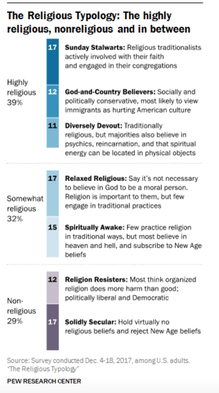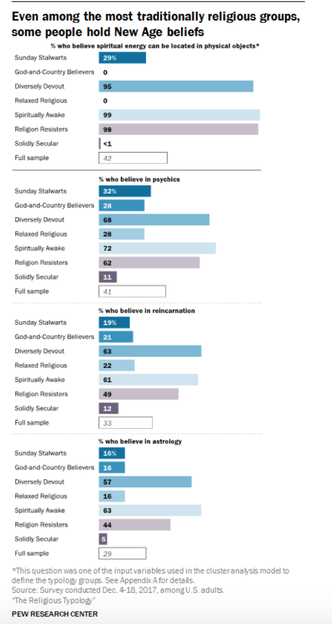 Last week a phenomenal research project was released by Pew, which laid out American views of religion on a typological spectrum. At one end are the die hard "Sunday Stalwarts," and at the other the "Solidly Secular." Most of the findings were unsurprising: Sunday Stalwarts were the ones who most frequently attended services and read Scripture, Solidly Secular tended to be more affluent and higher educated, a growing number of God and Country tended to skew more towards conservative and isolationist ideology as a religious identity, and that most people who identified as religious or Christian did not regularly attend worship. Most of these categories have been around in one form or another for quite some time. And it's these categories that have helped us understand our communities and the places we minister. As church leaders, understanding religious spectrum, especially in a post-Christian world, are critical for us to faithfully shepherd people in their daily lives.  But one finding was surprising, and prompted several spinoff articles highlighting the unique finding. The Sunday Stalwarts, who exhibited the most traditional religious views in the spectrum, who are most faithful in attending services and reading Scripture, had some really divergent views on New Age belief. Of the Stalwarts, 29% believed in "energy in physical objects" (like crystals), 32% believed in the power of psychics, 19% believe in reincarnation, and 16% believe in astrology. The implication is that many of the Sunday Stalwarts who sing classic hymns, attend Sunday School, and believe that their neighbors need to hear about Jesus are also willing to call a psychic, buy crystals, and hope they don't come back as a cockroach. For Pew, this was surprising because it went against the current of everything they had expected traditional religious belief to contain. And for those of us who lead in churches, it should be surprising because it shows that we have a long way to go in helping shape a biblical worldview in our churches. We cannot simply assume that all the people who gather on Sunday morning have a consistent and biblically informed worldview. Or that those who actively pledge membership to our churches are aligned with what we believe. As I read that, I was drawn to a phrase written on the mantle of my seminary alma mater's main building. It's a Greek inscription of 2 Timothy 1:15, "rightly divide the word of truth." It's a reminder that as Christian leaders, and certainly as pastors or teachers in the church, that we are in the business of truth. And that work requires that we not only highly view truth, but we rightly handle it. So how can we do that?
1. Faithfully Preach & Teach the Bible - Whenever we have an opportunity to teach or speak, teach or speak from the Word. When our pulpits become a place for us to wax on the good ol' days or where we cry against the ills of society, we're taking our people's eyes off what the preaching task is for: the proclaiming of what God has said in His Word. So whether you're an expository, book-by-book, verse-by-verse or a thematic or topical speaker, make sure you are faithfully in the Word. 2. Don't Avoid The Hard Parts - I firmly believe one of the issues behind the syncretism in the Pew research and in the rise of the "Nones" is that instead of dealing with the difficult parts of the Bible or the hard questions of our faith and ethics, we gloss over with pad answers or ignore it and move on. Whether it's sexual orientation, age of the earth, the role of faith in science, we've often reduced the Christian response to "You just have to have faith." 3. Call Spades - The other day I had a doctors appointment where I learned I had incredibly high blood numbers. My doctor wasn't a jerk about it, but he was very blunt and honest that I would need to make serious lifestyle, diet, and exercise changes in addition to medication to get those numbers under control. In Christian circles, we often set the goal at being nice, so we fail to say things are harmful because we don't want to not be nice. I'm not arguing for complete separation, but there are certain things Christians are to be set apart from, and as leaders we have a duty to set the boundary lines as a protection for people. 4. Graciously Take Questions - One thing I'm so thankful for over the years has been that mentors and leaders were willing to hear questions and thoughtfully answer them. Whether I was skeptical about something they taught on or was having trouble making connections between my faith and daily life, I was so glad they took time to answer them. We cannot blow off questions, those who ask them are seeking to know God and know Him better. 5. Pursue Humble Orthodoxy - I cannot encourage you enough as a church leader to read the book Humble Orthodoxy by Josh Harris. In it, we're reminded that our love for truth, our love for doctrine, should never outpace our love for God & Neighbor. So when we're dealing with people who have a crystal on their rear view mirror or who have gotten sucked into the latest Deepak Chopra book, we should never let our orthodoxy compromise our love and concern for them. If we do, we've missed the point of what truth means. Do you have a story about this happening in your church? How did you handle difficult issues? Were you surprised by the Pew findings?
0 Comments
Leave a Reply. |
Scott M. DouglasA blog about leadership and the lasting legacy of family ministry. Archives
August 2023
Categories
All
|
 RSS Feed
RSS Feed



